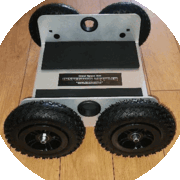The following bolded comments were taken from reports submitted to me by intrepid TIJ inspectors. I was disappointed because overall, the reports were pretty good. I was really hoping to complete this series with some outstanding examples of horrific writing, but I suppose I should have known better.
There were sharp handrail ends at the stairways, which should be serviced to help prevent injury.
We know what the writer intended, but a buyer or a contractor might not. How, exactly, does one ‘service’ a sharp railing end? I think this is better, more clearly stated thusly:
The end of the handrails on the stairs are sharp, which is a hazard. They should be rounded (or ‘returns should be installed’ or whatever the situation calls for) for safety.
An extension cord was being used to power the condensate pump, but it should be plugged directly into its own outlet for safety. Have an outlet installed.
The condensate pump is powered by an extension cord, which is hazardous. An electrician should be hired to hard-wire an electrical receptacle next to the sump pump so it can be safely plugged in directly.
The stairs leading to the apartment are not level. They drop from east to west at a rate that well exceeds the allowed ratio of 1:48. The condition can be construed as a trip hazard.
OK, we’ve all seen something like this hundreds of times. This was in an apartment attached to a 137-year-old commercial bakery. These places often have dozens of non-compliant features, some meaningful, some not. If it is important enough to put in the report, I think you owe it to your readers to use complete sentences and follow the OAR rule. This inspector nailed the observation, but the final sentence (analysis) is squishy and there is no recommendation. The phrase ‘can be construed as a trip hazard’ forces the reader to interpret it. I presume what the inspector was thinking was something along the lines of ‘I need to tell my client about this potential risk, but the only way to fix it is to rip the stairs out and rebuild them and I know he’s not going to do that and I don’t blame him. I have to write something, so I’ll just throw the criticism out there with a light warning.”
I think replacing the final sentence with something like the following would be much better.
“This is a tripping hazard. The stairs should be properly rebuilt for safety, which will be expensive.”
That communicates the risk to the buyer, lets them know fixing it is a big deal, and that they should fix it.
This is a very nicely built example of 1960’s construction. The floor joists and roof sheathing are slight by today’s standards but very typical for the era.
This strikes me as unnecessarily confusing. It’s nicely built, but slight? Personally, I would ditch the first sentence altogether. If there was ever a major problem in this house, I can imagine the plaintiff’s attorney’s pupils turning into little dollar signs after reading that sentence. I almost never wrote anything complimentary in a report. Your client knows the house is nice; that’s why they’re buying it. I recommend restraining your focus on what you’re required to report and what’s wrong with the house.
The toilet in the main bath is loose. It moves a lot. Repair will require removing the toilet and replacing the wax ring. This is a $6-8 project that should take about 20 minutes, maybe an hour if you have never done it before. Do not put it off. The wax ring could leak destroying the flooring and damaging the structure, the toilet could break, or both – costing hundreds or even thousands to repair.
Can we save the author a bit of time and trouble?
The toilet in the main bathroom is loose and moves when sat upon. Loose toilets leak, which will cause damage. This toilet should be properly reinstalled now. (This next line is optional:) It’s a fairly simple project that some handy people can take on themselves or you can have a plumber do it.
That's it, friends. Thanks for reading. I hope some of it was helpful.
Jim Morrison used to inspect homes in Greater Boston. Today he covers residential real estate for a trade publication in Boston. You can reach him at JamesAndrewMorrison@gmail.com
- Read more...
-
- 13 comments
- 8,289 views


.thumb.jpg.47289739c2f0532f4faffd07858bee59.jpg)

